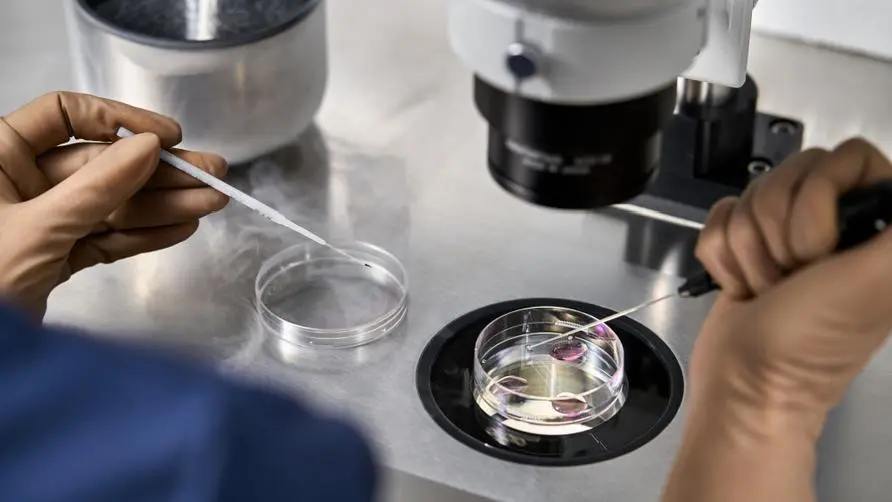Do you want your son to no longer have to go overseas to find the "Spirit Master"? Taiwan Ministry of Health and Welfare plans to open "surrogate mothers" to save the declining birthrate crisis

The declining birthrate has become a “national security crisis.” In order to increase Taiwan’s fertility rate, in recent years, in addition to the Executive Yuan’s introduction of in vitro fertilization subsidies to encourage childbearing, local governments have also successively launched egg freezing subsidy policies, hoping to preserve future fertility options. However, due to the restrictions of the Artificial Reproduction Act, those who want to have children through in vitro fertilization are only allowed to “opposite-sex couples”, excluding single women and same-sex couples; surrogate motherhood is even explicitly prohibited.
Will surrogate motherhood be opened to save the declining birth rate? Taiwan Ministry of Health and Welfare: “Three ethnic groups” plan to amend artificial reproduction law
According to public information from the Taiwan Ministry of Health and Welfare, Health Promotion Administration, artificial reproduction refers to the technology that uses the assistance of reproductive medicine to achieve the purpose of conception and childbirth by artificial methods other than sexual intercourse. Judging from the existing regulations, there are no regulations on matters related to surrogate mothers. According to the current Artificial Reproduction Law, couples who undergo surgery are limited to those whose wife can conceive and give birth to a fetus through the uterus. The surrogate mother is still unable to handle this.
Xue Ruiyuan, Minister of Taiwan Ministry of Health and Welfare, was recently interviewed by the Legislative Yuan Health and Environment Committee and said that the surrogate mother regulations in the Artificial Reproduction Act are currently prohibited. The Taiwan Health Promotion Administration has successively held communication meetings with experts and all walks of life, and the draft of the revised law is gradually taking shape. The Taiwan Ministry of Health and Welfare will propose a version that there will be a surrogate mother before making a choice. However, if the Legislative Yuan decides not to open the matter during the review process, the final review decision will still be respected.
Wu Zhaojun, director of the Taiwan Health Promotion Administration, further pointed out in an interview that in response to the draft amendment to the Artificial Reproduction Act, the Taiwan Health Promotion Administration has held 13 expert meetings in the past two and a half years, and 42 basic legal articles have been initially drafted. The amendment mainly focuses on " “Same-sex”, “Single women”, “Surrogate mother” and other three objects, and “children’s rights” are included into four aspects. During the process, everyone has what they want and have different objections, but we seek common ground amidst differences and continue to work hard to sort out a revised version of the law.
Young people are not in a hurry to have children right away? Single women would rather ovulate first than get married?
Dr. He Xinyi, director of the Taiwan Reproductive Medicine Society and vice president of the Hexin Yiyun Reproductive Center, pointed out that in recent years, women’s awareness of reproductive autonomy has been increasing year by year. In addition, late marriage and late childbearing have become a trend. Most single women and even married heterosexual couples often choose Perform a shorter egg-freezing treatment first to retain your right to have children in the future and not be in a hurry to have children immediately.
Dr. He Xinyi said that in clinical practice, he also encountered many single women who come to freeze their eggs and express that they do not want to get married, but they do not rule out the intention to have children. However, Taiwan’s “Artificial Reproduction Law” currently only allows couples to implement artificial reproduction. I am thinking about going overseas to seek relevant reproductive institutions in the future for single IVF treatment.
“In the past, the proportion of people who got married for the purpose of having children was 50% in a 2016 survey, but by 2023 it will only be 25%!” Dr. He Xinyi analyzed that he recently surveyed more than 2,000 women in Taiwan on their fertility wishes on the issue of reproductive autonomy. The decline in this ratio is the best example of women’s independent desire to have children and not marrying for the sake of having children.
Dr. He Xinyi, who has long been concerned about the issue of surrogate mothers, also analyzed that Taiwanese society has been discussing and promoting relevant bills for a long time, but hopes that the surrogacy packages can be better discussed in advance. “Many civil groups have also continued to stand up and appeal in recent years and do not want surrogate mothers.” I am being exploited unequally and am worried about the objectification of women. There is a need for a better social consensus on how to make choices regarding women’s autonomy and reproductive choices, and to make perfect adjustments to laws and regulations."
Do you want your son to no longer have to go overseas to find the “Spirit Master”? Medical appeal: The law should provide equal protection to same-sex couples
Dr. Shen Shenyou, director of the Preconception Genetics Department of Hexin Yiyun Reproductive Center, pointed out that the Artificial Reproduction Law has not yet progressed to legalize artificial reproduction for same-sex marriages, but same-sex couples still have the opportunity to go overseas for artificial reproduction.
Dr. Shen Shenyou said that he had met a lesbian couple before and wanted to use one partner’s eggs to implant into the other partner’s uterus. However, due to restrictions under Taiwan’s Artificial Reproduction Law, the eggs could only be frozen in Taiwan first. After that, they go overseas to find a “sperm master” to combine the embryos and implant them into the uterus. The whole process is not only expensive, but also has many unpredictable medical risks associated with overseas child seeking.
Dr. Shen Shenyou pointed out that it has been more than four years since Taiwan passed the same-sex marriage law in 2019. There is already a considerable degree of consensus in society on issues of same-sex couples and fairness and equal rights. Discussions are conducted from the perspective of “equal rights” and “fairness and justice.” Since same-sex marriage has been Over the years, society has reached a high level of consensus on equal rights. Heterosexual couples can have children through in vitro fertilization, and the law should also provide equal legal protection to same-sex couples who are married.
Further reading:




